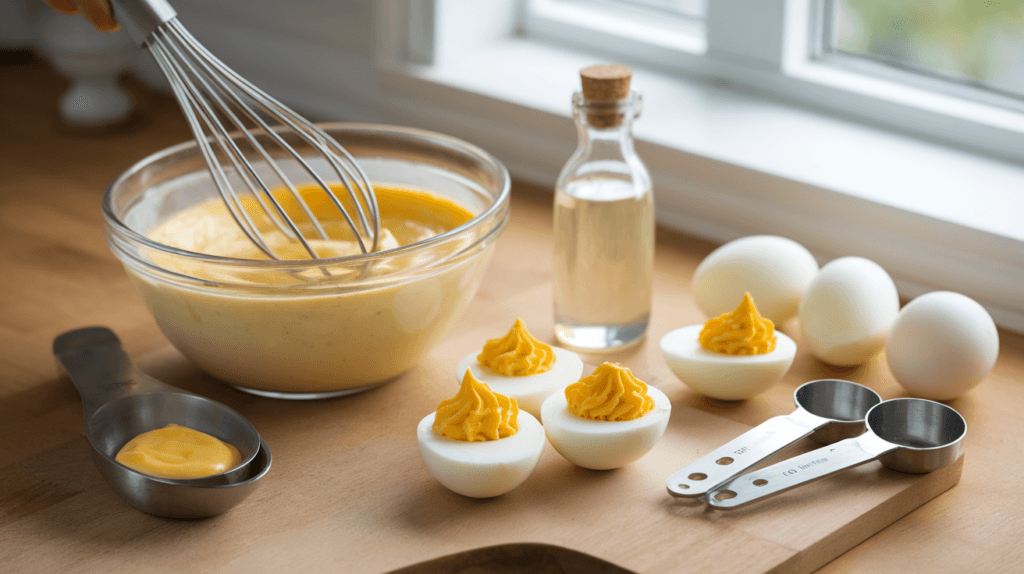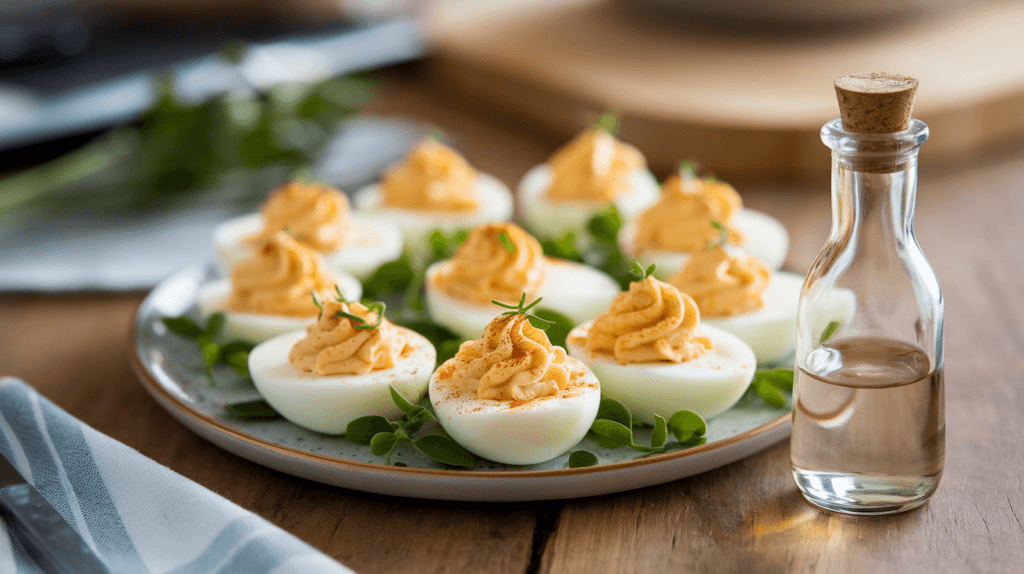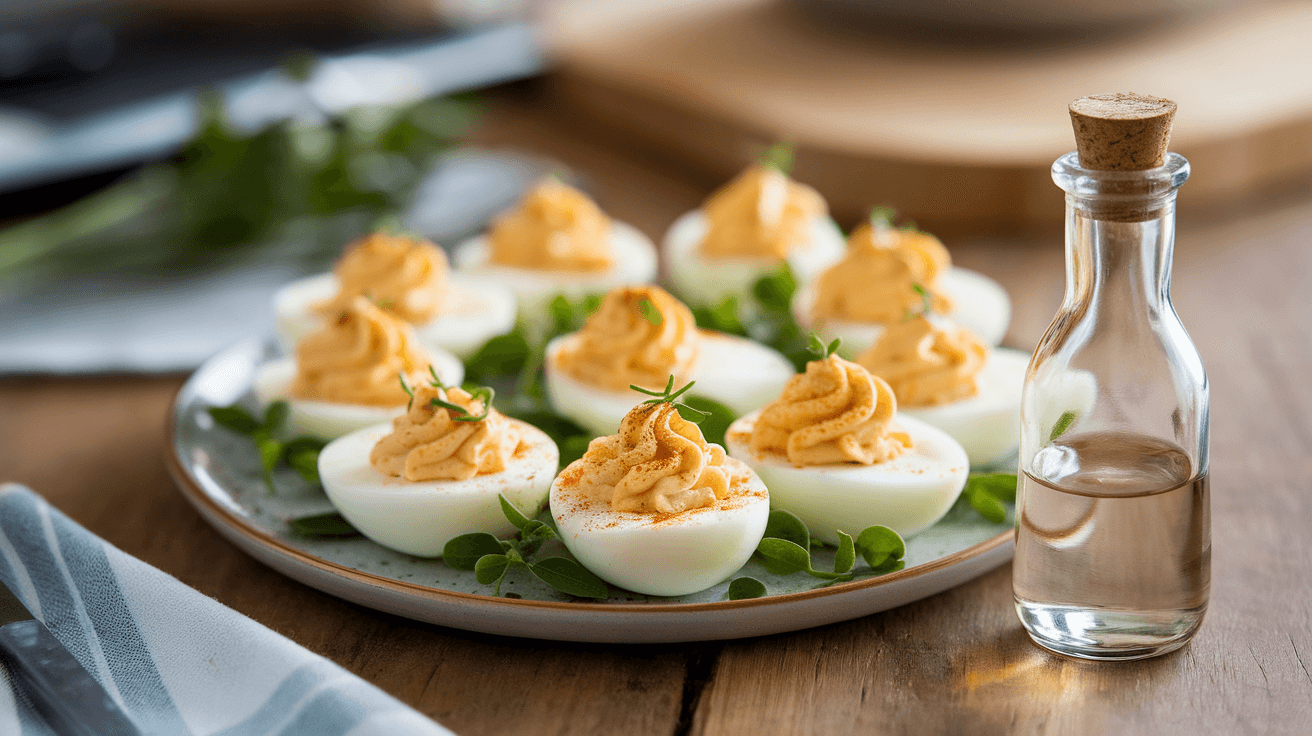Introduction
Deviled eggs are a beloved dish, often gracing tables at potlucks, parties, and holiday gatherings. This timeless appetizer is cherished for its creamy filling, rich flavors, and endless customization possibilities. Yet, one ingredient in traditional recipes often sparks curiosity: vinegar. Why do people put vinegar in deviled eggs, and what role does it play in creating the perfect bite?
In this article, we’ll explore the purpose of vinegar in deviled eggs, how it enhances the flavor profile, and alternative ways to achieve similar effects. Whether you’re a seasoned cook or a curious foodie, you’ll gain a deeper appreciation for this tangy addition to a classic dish.
Why Do People Put Vinegar in Deviled Eggs? The Basics Explained

Deviled eggs are a popular appetizer that combines simplicity with versatility. At their core, they are hard-boiled eggs, halved and filled with a creamy, seasoned yolk mixture. This dish has a long history, dating back to ancient Rome, but it has become a staple in modern cuisine for its adaptability and irresistible flavor.
What Are Deviled Eggs and Why Do People Put Vinegar in Them?
Deviled eggs are made by carefully slicing hard-boiled eggs in half and removing the yolks. The yolks are then mashed and combined with flavorful ingredients like mayonnaise, mustard, and spices to create a creamy filling. This mixture is piped or spooned back into the egg whites, resulting in a visually appealing and delicious snack.
Common Ingredients in Deviled Eggs
While the specific recipe for deviled eggs can vary, some ingredients are almost universal:
- Eggs: The foundation of the dish, typically boiled to perfection.
- Mayonnaise: Provides creaminess and richness to the yolk mixture.
- Mustard: Adds a tangy kick and enhances the overall flavor.
- Vinegar: Balances the richness with acidity and depth.
- Seasonings: Salt, pepper, paprika, and other spices elevate the taste.
Optional ingredients like pickle relish, hot sauce, or fresh herbs can be added to customize the flavor further.
Why Do People Put Vinegar in Deviled Eggs and How It Enhances Flavor

The addition of vinegar in deviled eggs isn’t just a random choice—it’s a purposeful ingredient that elevates the dish. Vinegar plays a crucial role in enhancing both the flavor and texture of the yolk mixture, making it a beloved addition to this classic recipe.
The Science Behind Vinegar’s Role
Vinegar is acidic, which means it interacts with other ingredients to balance the overall taste. The richness of egg yolks and mayonnaise can be overwhelming, but vinegar cuts through the heaviness, offering a refreshing contrast. This acidity also acts as a flavor enhancer, making the dish more vibrant and appealing.
Vinegar’s Flavor-Enhancing Properties
One of vinegar’s primary roles in deviled eggs is to amplify the flavors of the other ingredients. Just a small amount can make the mustard tangier, the mayo creamier, and the yolks more savory. The subtle tang of vinegar ensures that every bite of the deviled egg is satisfying and well-balanced.
Balancing Acidity in Deviled Eggs
The key to a great deviled egg is balance. Vinegar helps achieve this by adding a hint of sourness to offset the richness of the filling. Without it, the mixture might taste too heavy or one-dimensional. For this reason, vinegar is considered an essential ingredient by many cooks who want to create a harmonious flavor profile.
In addition to flavor, vinegar can also help stabilize the texture of the yolk mixture, ensuring it remains smooth and cohesive. This makes it easier to pipe or spoon the filling into the egg whites without it becoming too thick or clumpy.
Why Vinegar in Deviled Eggs Matters: Types of Vinegar to Use

Not all vinegars are created equal, and the type you choose can have a significant impact on the flavor of your deviled eggs. While classic recipes often call for white vinegar, other varieties can offer unique flavors and characteristics to suit your taste preferences.
White Vinegar: The Classic Choice
White vinegar is the most commonly used type in traditional deviled egg recipes. Its sharp and clean flavor profile adds just the right amount of tang without overpowering the other ingredients. Additionally, white vinegar is readily available and pairs seamlessly with mustard and mayonnaise, making it a convenient and reliable option.
Apple Cider Vinegar: A Tangy Alternative
Apple cider vinegar offers a slightly sweeter and fruitier taste compared to white vinegar. Its milder acidity makes it an excellent choice for those who prefer a less sharp tang. Apple cider vinegar also adds depth to the flavor profile, complementing the creamy yolk mixture with its subtle fruity undertones.
Other Vinegars and Their Unique Flavors
For adventurous cooks, experimenting with different types of vinegar can lead to exciting results:
- Balsamic Vinegar: While unconventional, its rich and slightly sweet flavor can add a gourmet twist to deviled eggs.
- Rice Vinegar: Known for its mild and delicate acidity, rice vinegar is ideal for those who prefer a softer tang.
- Red Wine Vinegar: Adds a bold and slightly fruity taste, perfect for those who enjoy a robust flavor profile.
Each type of vinegar brings its own unique character to the dish, so feel free to experiment and find the one that best suits your palate. No matter which you choose, the goal is to enhance the overall flavor and create a well-balanced deviled egg.
Balancing Flavors in Deviled Eggs
Creating the perfect deviled egg is all about achieving a balance between richness, tanginess, and seasoning. Vinegar plays a critical role in this balancing act, but its effect is further enhanced by the way it interacts with other ingredients. When combined thoughtfully, the flavors in deviled eggs can become harmonious and delicious.
How Vinegar Complements Mustard and Mayo
Vinegar pairs beautifully with the two other key ingredients in deviled egg filling: mustard and mayonnaise. Mustard, with its sharp and slightly bitter flavor, benefits from vinegar’s acidity, which amplifies its tanginess. Similarly, mayonnaise, which provides creaminess and richness, is brightened by vinegar, preventing it from tasting too heavy or cloying.
This synergy between vinegar, mustard, and mayo ensures that every bite of a deviled egg is vibrant and satisfying, with no single flavor dominating the others.
Adjusting the Taste to Personal Preference
One of the best things about making deviled eggs is the ability to customize the flavor profile to suit your personal taste. Vinegar is versatile, and its amount can be adjusted to achieve the desired level of tanginess. For a subtle hint, use less vinegar, or for a bolder punch, increase the amount slightly.
Here are some tips for finding the perfect balance:
- Start Small: Add a few drops of vinegar at a time, tasting the mixture as you go.
- Consider the Other Ingredients: If your recipe includes sweeter elements like relish, a bit more vinegar might be needed to maintain balance.
- Mix Thoroughly: Ensure the vinegar is evenly incorporated into the yolk mixture to avoid concentrated tangy spots.
Remember, the goal is to create a deviled egg that satisfies your taste buds while maintaining harmony among all the ingredients.
Finding the Perfect Balance for Guests
When serving deviled eggs at a gathering, consider that your guests may have varying preferences for tanginess. A neutral recipe with a moderate amount of vinegar is often the safest choice. You can also offer a variety of deviled eggs by experimenting with different types of vinegars or even omitting it in some batches, giving your guests a range of flavors to enjoy.
Cultural Variations in Deviled Eggs
Deviled eggs are a globally loved dish, but their preparation and flavor profiles vary widely depending on the region and cultural influences. While the classic version featuring mayonnaise, mustard, and vinegar is iconic in many countries, other regions have given this appetizer their own unique twist.
Southern-Style Deviled Eggs
In the southern United States, deviled eggs are often sweetened with the addition of pickle relish or sugar. These additions create a slightly tangy-sweet flavor that contrasts beautifully with the creaminess of the yolk mixture. Paprika and a dash of hot sauce are also common garnishes, giving the dish a bit of heat and a burst of color.
European Influence
Across Europe, deviled eggs take on a variety of unique flavors. In countries like Hungary, they are spiced with paprika, a national favorite. Meanwhile, in France, deviled eggs may include Dijon mustard for an elevated, sophisticated tang, paired with fresh herbs like tarragon or chives to add a layer of complexity.
Asian-Inspired Variations
Asian-inspired deviled eggs often incorporate ingredients like soy sauce, sesame oil, or sriracha to add umami and heat. Japanese-style deviled eggs may feature a touch of wasabi or miso paste in the yolk mixture for a bold, distinctive flavor that complements the creamy texture.
Latin American Influence
In Latin American cuisine, deviled eggs might be infused with flavors like lime juice, chili powder, or cilantro. These additions create a zesty and vibrant profile, perfect for pairing with the rich yolk filling. Sometimes, avocado is added to the mixture for extra creaminess and a subtle, buttery taste.
Each cultural variation of deviled eggs demonstrates the versatility of this dish. Whether you prefer the classic recipe or are inspired to try international flavors, there’s a version of deviled eggs to suit every palate.
FAQs
Here are some of the most frequently asked questions about using vinegar in deviled eggs, along with clear and concise answers to help you master this classic dish.
Why is vinegar used in deviled eggs?
Vinegar is added to deviled eggs to balance the richness of the yolk mixture and enhance the overall flavor. Its acidity cuts through the heaviness of ingredients like mayonnaise and mustard, making the dish more vibrant and appealing.
Can I make deviled eggs without vinegar?
Yes, you can substitute vinegar with other acidic ingredients such as lemon juice or pickle juice. However, the flavor profile will vary slightly, and the dish may lack the distinct tang that vinegar provides.
What type of vinegar works best?
White vinegar is the classic choice for its clean and sharp taste. Other options, such as apple cider vinegar or rice vinegar, can be used to introduce unique flavors to the dish.
How much vinegar should I use?
Typically, recipes call for 1–2 teaspoons of vinegar per six eggs. This amount can be adjusted based on personal preference or the type of vinegar used.
Can vinegar change the texture of the yolk mixture?
Yes, vinegar can slightly loosen the yolk mixture, making it easier to pipe or spoon into the egg whites. It also helps create a smoother, creamier filling.
Are there health reasons to include vinegar?
Vinegar has several health benefits, including aiding digestion and stabilizing blood sugar levels. While the amount used in deviled eggs is small, it still contributes to the dish’s nutritional value.
Conclusion
Adding vinegar to deviled eggs is a small but impactful step that elevates this classic dish. Whether you’re using white vinegar for a traditional tang or experimenting with other varieties like apple cider vinegar, the acidity balances the rich flavors of the yolk mixture, ensuring a harmonious and satisfying result.
Deviled eggs are a versatile appetizer, and vinegar plays a crucial role in making them irresistibly delicious. By understanding how vinegar enhances flavor, experimenting with different types, and adjusting to personal preferences, you can create deviled eggs that are truly unforgettable. So, the next time you prepare this beloved dish, don’t skip the vinegar—it might just be the secret ingredient your guests rave about!

